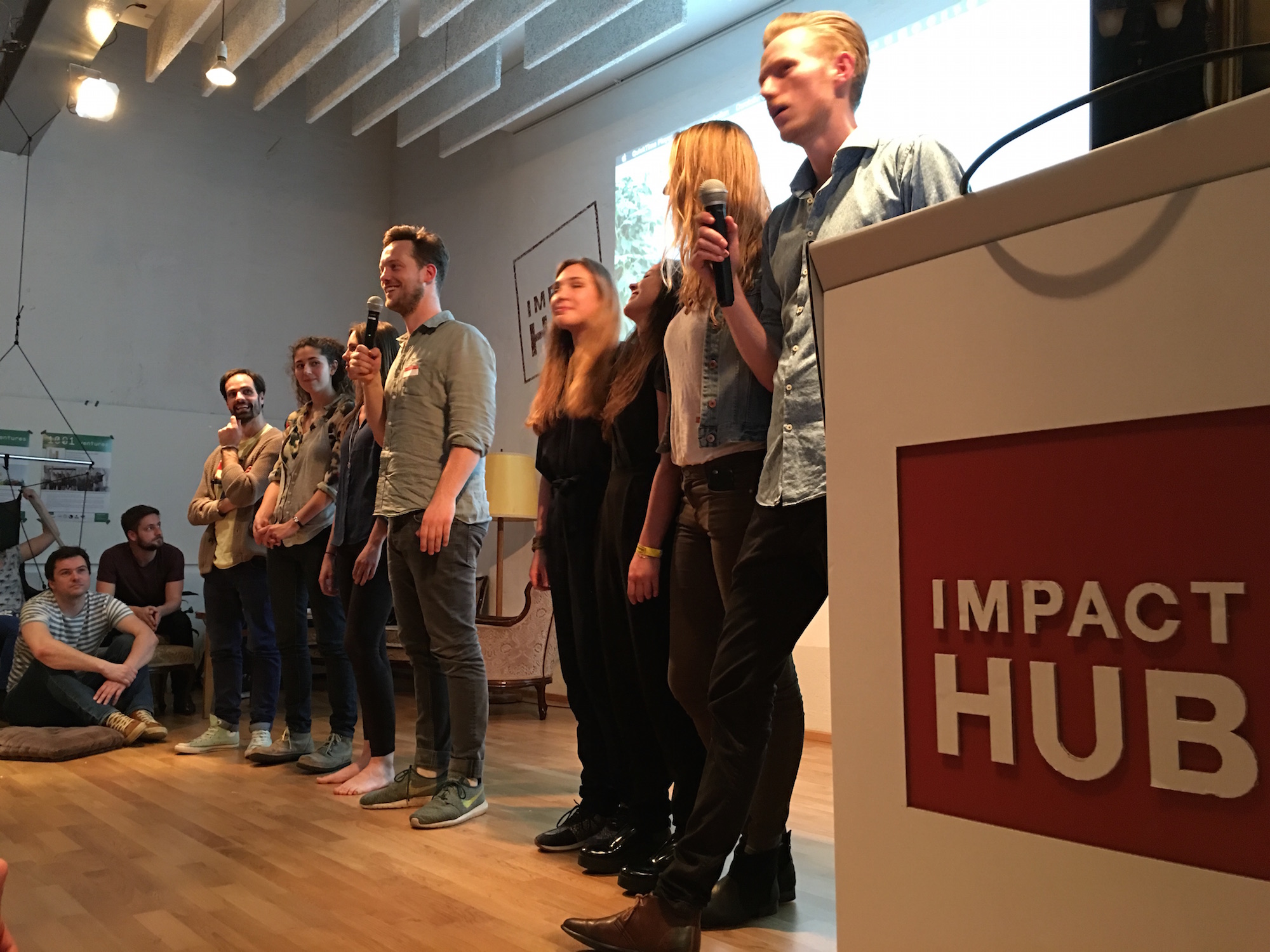(Editor’s note: Dispatches contributors Terry Boyd and Ivana Avramovic attended the Sunday night hackathon showcase at Vienna Impact Hub and came away mightily impressed.)
A new and varied startup scene is taking shape in Vienna, a city that’s never quite shown signs of challenging Berlin, Amsterdam, London or Stockholm. Yet, increasingly, the ingredients seem to be here.
 Last weekend, seven startups seeking better marketing and messaging were selected for a 48-hour hackathon, 1001|Hackathon for Social Impact. The event paired 40 social entrepreneurs from across Europe with creative agencies including digital marketing agencies, animators, illustrators and photographers. The results were social new websites, new social media efforts, new videos and new presentations for a standing-room-only crowd at the closing showcase Sunday night.
Last weekend, seven startups seeking better marketing and messaging were selected for a 48-hour hackathon, 1001|Hackathon for Social Impact. The event paired 40 social entrepreneurs from across Europe with creative agencies including digital marketing agencies, animators, illustrators and photographers. The results were social new websites, new social media efforts, new videos and new presentations for a standing-room-only crowd at the closing showcase Sunday night.
But the story behind the story might be how much this tells us about where Vienna is headed innovation-wise.
Barbara Inmann, a co-founder of the Vienna Impact Hub, gave us both the details on the hackathon, and an overview of Vienna’s startup eco-system. The Vienna organization is part of the global network of social entrepreneur centers founded in London in 2005. Today, there are 80 Impact Hubs on five continents with 11,000 members and 17 new hubs in the works.
Inmann, a Vienna native, has been involved in social entrepreneurism since 2008 and has worked for various efforts in Berlin, where she wrote her master thesis, as well as at the Impact Hub in San Francisco. So she has a basis for comparison. Her take: The Viennese scene is attracting more talent, more capital and more attention from the U.S.
Interactive design and technology startup Polycular, went to Silicon Valley for an incubator and returned.
One of the weekend hackathon participants, Robo Wunderkind, is going to China to build its prototype. Corporations are increasingly interested in using the Impact Hub’s impressive 1,200 m2 (13,000 square feet) building, located just off the “Fashion Mile” in the Lindengasse section of Vienna. Oracle executives came to Vienna, proposing to Impact Hub organizers “that we come together to promote a hackathon,” said Kai Wichmann, communications manager for the innovation hub. Increasingly, Austrian politicians and policymakers are making pilgrimages to Silicon Valley. Select Austrian startups have gone to accelerators in The Valley, courtesy of the Austrian Trade Commission.
We also noticed there were an impressive number of expats/techpats involved, with the U.K., Eastern Europe and Asia well represented.
 The overall sentiment Sunday night was that Vienna overslept the startup hype that swept Berlin and other cities during the last 10 years, but now is waking up at just the right time. The final showcase night of the Hackathon drew more than 120 people, the vast majority of whom were under 30 years old. Several of the hackathon teams acquitted themselves well, and the ambiance was celebratory to say the least, with the wine and beer flowing.
The overall sentiment Sunday night was that Vienna overslept the startup hype that swept Berlin and other cities during the last 10 years, but now is waking up at just the right time. The final showcase night of the Hackathon drew more than 120 people, the vast majority of whom were under 30 years old. Several of the hackathon teams acquitted themselves well, and the ambiance was celebratory to say the least, with the wine and beer flowing.
But this wasn’t an event with Silicon Valley-style testosterone-fueled chest thumping among future billionaires. The refrain from the presenters and attendees was, “This is about making the world better.”
Though they’re nominally non-profits, Wichmann pointed out that many have commercial potential in the vein of Toms Shoes, which is both a social-good effort “and a billion dollar company.” The two approaches are not mutually exclusive, he said. Asked if potential investors wouldn’t prefer an exit as opposed to changing the world, Wichmann said they’re “parallel narratives. Just because there’s no ‘exit’ doesn’t mean there isn’t a strong investment case.”
That’s the social good side of the equation. Vienna has a separate – though intersecting – commercial tech scene, with programmers, coders and developers moving between both camps.
In a country of only 8 million, everyone in Vienna’s startup community knows each other, Inmann said.
Sektor5, a co-working space and entrepreneurial community, is a few minutes away by subway. Schraubenfabrik, the city’s first co-working space/entrepreneur center, dates back to 2002. But Impact Hub appears to be operating on a different level, with 450 members. Revenue streams include fees for office spaces, events space rentals in the giant 13,000-square-foot building, programs with corporate partners and non-profits such as the Climate Fund of Vienna, as well as membership fees of $20 per person.
So, what does the Impact Hub product look like? The Hackathon participants were a mixed bag.
They included:
• Compuritas, which takes high-value, if obsolete, business computers, refurbishes them, then gives them to schools and NGOs in the developing world. They’re motto is, “If computers have had their day at a company, then it’s Compuritas‘ turn.”
• Robot Wunderkind’s goal is to make coding and robotics “as fun and simple as playing with building blocks.” The simple, yet sophisticated, robots are designed to help children as young as five years old learn coding and the basic mechanics of robots. Electronic components are embedded into blocks with a Bluetooth connection so they can be programed from a smartphone or tablet. The Robot Wunderkind team developed stop-action video and other marketing tools during the hackathon.
• FragNebenan is a social-media campaign to bring neighbors together. This was perhaps the most entertaining presentation of the night. The FragNebenan approach is to take people beyond the stereotypes of bad neighbors and reveal a person worth knowing underneath. The “tussi” (bimbo) turns out to be quite handy, with the power tools prove it, and the grumpy neighbor who enforces apartment building rules is in fact the guy who is always happy for you to drop in for his fabulous cupcakes. The campaign developed both online video and paper collateral including vintage Viennese-style postcards and sticky notes that say, “I have … I need.” From their pitch: FragNebenan is a network for urban neighborhoods. It’s the place where neighbors can meet 24/7, share knowledge and resources, organize mutual aid or chat about local issues. It’s the place where urban community and social cohesion is enabled in a 21st century digital society.
• RefugeesWork gave the most emotional pitch of the night, with new video created during the hackathon. Their goal is to get rid of the label “refugee” and the associated stereotypes and show businesses how many professionals with valuable skills there are among new arrivals, 30-percent of whom are academics. With more than 60,000 refugees in Austria, “they represent a massively underused resource,” according to their pitch. “If integrated into society, these refugees offer a large and talented workforce.”
• Investment-Ready.org brings investors and mentors to social entrepreneurial efforts. Their new presentation also was entertaining, with startup participants discussing their relationships with investors and mentors in the language of dating and love affairs: “He seemed interested, but was he just trying to be nice?” and “Finding the right investors is as difficult as finding the right life partner.”
- aWaTTar is a natural energy reseller that’s attracted 1,000 customers in one year. The team came to the hackathon concerned their presentation to consumers was too technical. Also, the message is mixed because though aWATTar, an after-market seller of both Green Power and fossil-fuel energy, is often the less-expensive option. But they know their clients are more interested in participating in the Green Power movement. From their pitch: aWATTar gives the option to use both, and saves you money in the process.














